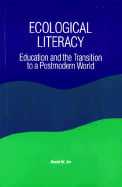| Ecological Literacy
|
|||
 |
Orr, pp. 25-84 and chapter V, pp,
85-96.
|
||
 |
|||
| What is ecological literacy?
|
|||
| Vocabulary | |||
|
Ecological Society of America | ||
called ecolacy
what it says, how to measure to ask and then what?
a science of consequences
Can you
identify it when you see it?
yes – comprehending human impacts or a coral reef requires ecolacy.
Postman pp.1-99,
especially on Discourse. (discourse is the art of
communicating well from speaking clearly and convincingly, to convey accurate
information so as to motivate thought.)[1]
http://www.lenntech.com/water-ecology-faq.htm
Interpreting the environment to outsiders,
David Orr, pp. 23-84.
"the fit between humanity and its habitat....resources,
population, climate change, species extinction, acid rain, deforestation, ozone
depletion, and soil loss."
83.
"wide understanding, competence, and commitment to the common
good."
84.
"a broad familiarity with the development of ecological consciousness."
"the extension of ethical obligations to the land community, careful ecological
design, simplicity, widespread
competence with natural systems, the sense of place....
p. 94.
"contrasting Promethean view" (Westphalian
approach to sovereignty and war) with ecological
views
"The
ecologically literate citizen will recognize these immediately for what they
are: the stuff of epitaphs. Ecological literacy leads in other, and more
durable, directions toward prudence, stewardship, and the celebration of
Creation."
p. 95.
From David Orr selected passages that clarify what we need to know and do to promote ecological literacy:
"and still fail because its graduates were unable to make the leap from 'I know,' to 'I care,' to 'I'll do something.' . . . involving the integration of analytic intelligence...."
p. 147.
| Thomas Kuhn | ||
| The Structure of Scientific Revolutions | ||
| --> versus public knowledge | ||
The state of the planet represents a series of anomalies for contemporary education.
Any adequate response to the emerging agenda of the twenty-first century will require . . .
p. 147.
"Ecology has been isolated within biology departments as though it had little or nothing to do with the social sciences, the humanities, or the professions. The result is a pervasive anthropocentrism (human obsessed) that manifests the roles of humans and their ideas,.... that assumes nature to be infinite, and human ingenuity to be the ultimate resource."
pp. 134-135.
"The manifest errors in such thinking might have been eliminated with a dose of ecological literacy, a nodding acquaintance with thermodynamics, a brief study of history, and a modicum of ethical sensitivity, and common sense."
"...other disciplines could likewise profit from a cross-fertilization with ecology."
p. 135.
Can we describe Lake Apopka and the
Apopka community in ecologically coherent terms?
1.
Obstacles

